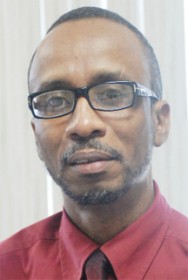Head of the Commission of Enquiry into the Operations of City Hall, Keith Burrowes talks with The Guyana Review
Keith Burrowes is altogether unsurprised over the fact that the outcomes of the 2008 Commission of Enquiry into the operations of the Georgetown Municipality have not, so far, brought the citizenry bountiful returns. “It would have been surprising if that were the case. What the report did was to create a general awareness of the problems of the municipality. That, I believe, was significant. Indeed, we had reached a point where none of the stakeholders were any longer questioning the problems facing the Council. In addition to that what the report did was to lay down some clear guidelines for enhancing the quality of service delivery.”

The management and finance specialist currently serving as Executive Director of the Health Sector Development Unit (HSDU) also believes that remedying all of the ills of City Hall has to be “a process,” to which all of the stakeholders must contribute. We need to be very clear on one thing. The citizens have obligations too and if those obligations are not met the problems of the City Council will not go away. To be more specific people must pay their rates and taxes if the Council is to be in a position to deliver the services that they require.”
Heading the City Hall Commission of Enquiry could have been a decidedly discomfiting assignment for a technocrat. The municipality is headed by an ageing but garrulous former Prime Minister and there is no love lost between him and the ruling People’s Progressive Party (PPP/C) administration. When the Commission of Enquiry was announced few people would have predicted anything else but unending controversy between the municipality and the Commissioners. Burrowes led from the front and what he accomplished was considered in the circumstances to be considerable. Not only did he manage to forge a professional relationship with the Council; he also persuaded the municipality that his assignment was professional not political and that what he was doing was for the good of Georgetown and the good of the Council. In the end, and, perhaps, unexpectedly, the findings of the Commission, though heavily critical of the Council won the support of both the government and the municipality.
Burrowes’ approach to addressing his assignment is largely credited with the outcome. His success in persuading the Council that the enquiry was “for its own good” won him the approval of a bureaucracy that could have been hostile and counterproductive; and when, eventually, the media was summoned to be told the findings of the Commission of Enquiry Burrowes was careful to place emphasis on the management and organizational problems at City Hall, playing down the more sensational issues of the fate of the Town Clerk and the City Treasurer, though the two were to be subsequently dismissed. “Frankly, at the time we had much more important things to deal with than the issue of personalities. The Town Clerk and the City Treasurer may have been part of the structure but in a sense they were not the real problem.”
Burrowes believes that the primary challenge facing the Council is that it has

simply failed to evolve to keep pace with changes in the society. “Contemporary municipalities across the world play a central role in shaping the administration of communities. The Georgetown City Council is way behind what a modern municipality ought to be. We need a more modern municipality.” By modern he means enlightened, better equipped to respond to the challenge of managing the city and possessed of an understanding of its role in relation to the roles of other institutions. Burrowes points out for example, that while the City continues to attribute many of its shortcomings to “human resource deficiencies,” many of the reasons for the problems lie elsewhere. He points for example to the impact of failure to enforce the extant zoning law. “By failing to police these laws we have, in fact, created a number of rather permanent problems. The Council complains about human resources but if you examine the situation carefully you will find that in some cases indifference to enforcing the law is really the problem.
From Burrowes’ standpoint a modern municipality may also mean changes to labour-management relationships which allow for more flexibility in the assignment of Council workers. “Sometimes the rules dictate that a particular group of workers cannot deliver a service outside the confines of what they are contracted to do. We need to look at the kinds of training and the kinds of union- management agreements that allow those workers to perform other tasks.
If only because he understood from the inception that the City Hall challenge would be a mountain rather than a hill to climb Burrowes is not particularly daunted by the challenge. He admits to interludes of tiredness and frustration but says that he is happy to soldier on, pointing to what he says are the “good things” that have already been accomplished. “We have already done significant work in seeking to improve the regulatory and financial systems. A new data base has been installed at no cost to the Council.” In addition to these Burrowes is currently ‘tinkering’ with a number of other initiatives including a data base for monitoring the changing of hands on property and a system for constantly monitoring the performance of kokers in Georgetown and its environs. “I believe that these mechanisms ultimately makes the City much easier to manage” Burrowes says.
Burrowes is seeking what he describes as “cultural and professional reform” in the municipality. We have changed the way we do things. We also have to become more aware of the importance of applying a professional approach to the completion of tasks,” Burrowes says. The former North Ruimveldt Multilateral School and Queen’s College schoolboy who is credited with setting up the country’s first National Student Council Association says that his role as Chairman of the Commission and, subsequently, as Head of the Implementation Committee is driven by no more than a strong desire to give. “I believe that after you would have come and gone people should know that you were there and that you contributed to positive change,” Burrowes says. He does not recall precisely what he was offered to Chair the Commission. “Whatever it was I gave it to the people who helped me with typing and other administrative matters pertaining to the work of the Commission of Enquiry,” he says.
When you ask Keith Burrowes what he considers to be the primary challenges confronting the municipality he is unequivocal. The problems, he says, are tied up in “inefficient management, getting value for money and modernizing the way things are done. He does not, for example, necessarily disagree with the Council’s call for an increase in rates and taxes but insists that any such lobby has to be attended by an initiative to manage existing revenue more effectively. “The Council’s complaint about being cash-strapped and wishing to see rates and taxes increased has to balanced against its ability to improve its capacity to collect those already outstanding rates and taxes,” Burrowes says. The weaknesses in the rates and taxes collection system are clear. Burrowes says that at the moment the Council still has no clear idea as to the volume of monies outstanding. He points to the fact that a number of properties are now liable to pay increased rates given the fact that over times they have converted their premises from residential homes to business places. “There is simply no record of many of these conversions and this is one area of slippage within the municipality which, if it can be addressed, can make a significant difference to the municipality’s revenue base. It is not a question of whether you are deserving of more funding than you have at the moment but how effectively you are collecting and managing the funds currently at your disposal.
Burrowes is obsessed with management systems. “When the systems are in place, when there is general agreement on what it is that we have to do, management actually comes down to monitoring the progress we are making towards our agreed goals,” Burrowes says. He makes his point about “systems” by producing two manuals which, in his capacity as Chairman of the Committee set up to implement the recommendations of the Commission of Enquiry, he prepared for the Council. The first, a Collection and Debt Recovery Manual, covers a range of stipulated policies for managing debt recovery including collection procedures, customer management, making payments, legal action, writing off bad debts and accounts in arrears. That apart and in the light of the financial management difficulties at City Hall which emerged in the report, the new manual also addresses issues related to the issuance of receipts and the banking of monies. The second manual, an Internal Controls And Compliance Manual seeks to review the current status of internal controls within City Hall and recommends a rash to measures to be included in internal controls procedures in the future.
And indeed an eminent case can be made for suggesting that City Hall is benefitting from the best kind of advice that it can have. Keith Burrowes has built a quiet but considerable reputation as a performer, having given service at the levels of the Guyana Sugar Corporation (GUYSUCO) as a member of its Board as well as the Guyana National Newspapers Ltd. (GNNL) as its Chairman. That apart, Burrowes has been professionally associated with the Canadian International Development Agency (CIDA) the Pan American Health Organization (PAHO0 AND THE European Union. (EU).
Long before the report of the Commission of Enquiry had completed it6s work, Burrowes had already begun to make an impact at City Hall. “We had begun to implement improved financial systems long before the final report had been completed. We looked at systems for the issuance of staff loans as well as the installation of equipment and training to improve financial management systems.”
Among other things, Burrowes believes that the efficient management of the municipality has to begin with a clear identification of its priorities and the focused pursuit of those priorities. “It is clear that in some cases and even in its financially weakened state the Council is subsidizing its non-core activities.” The issue has arisen previously at meetings between the municipality and the local private sector which has called on the municipality to “sell off” its various Day Care Centres to the private sector in order to cut expenditure. He wants, he says, to seek to persuade the City Hall bureaucracy to think outside the box, to cut itself adrift of the trappings of a tradition which no longer does justice to the city it serves.
He sees his own role from the perspective of “giving service.” The former North Ruimveldt and Queen’s College student credited with spearheading the creation of a National Students’ Council is keen to dispel the notion that his involvement with restoring the municipality is driven by meaningful material gain. “To tell the truth I cannot now recall exactly what it was that I was offered for the job. Whatever it was it went to the good people who helped me administratively with the report,”





